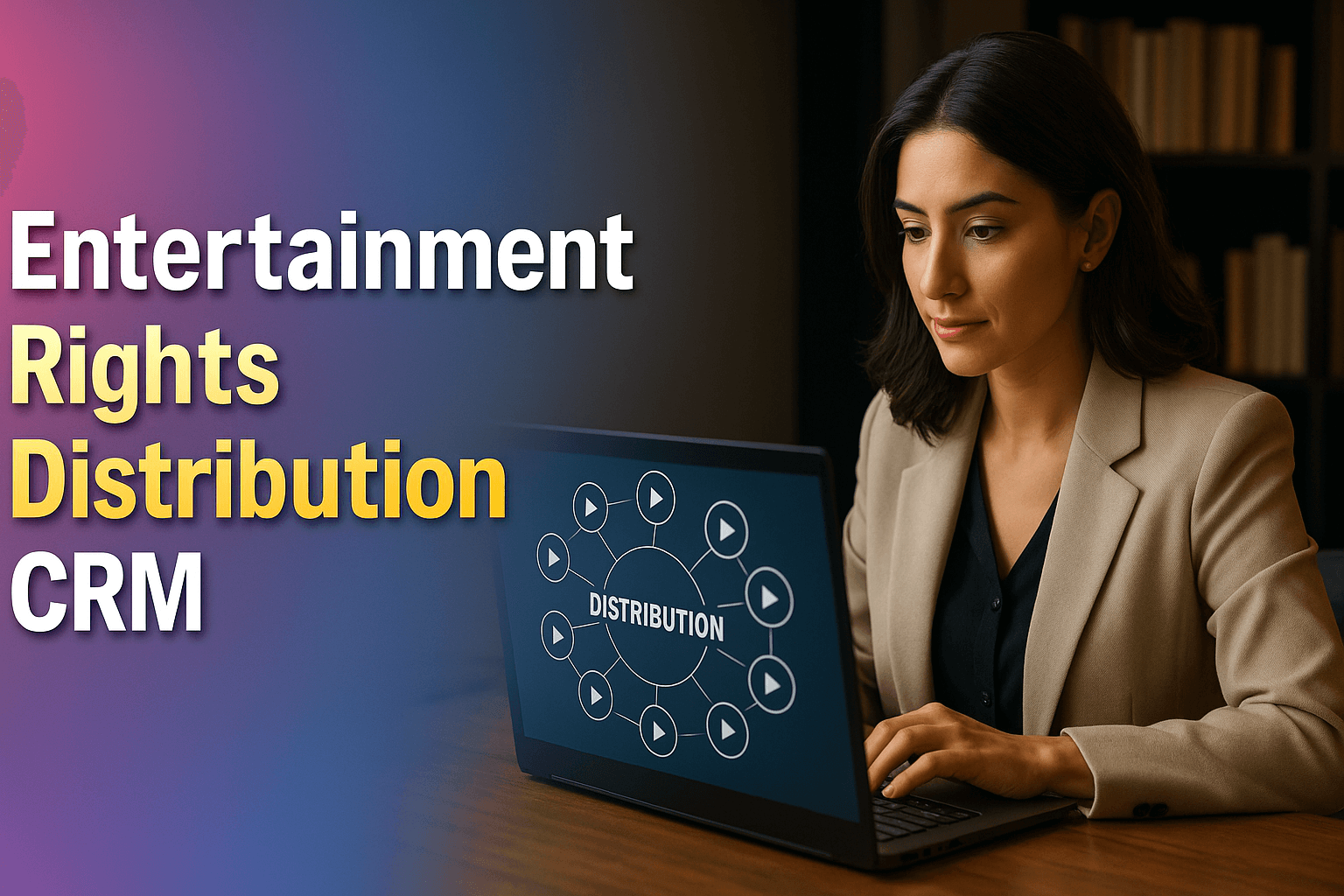The Strategic Necessity of an Entertainment Rights Distribution CRM

Introduction
In my analysis, a film or TV show is not just a creative work; it’s a complex portfolio of intellectual property, with thousands of potential revenue streams tied to specific territories, platforms, and time windows.
For many media executives, managing this complexity is a major source of inefficiency and revenue loss. The fragmented web of spreadsheets, shared drives, and manual calculations is an outdated system. For executives and sales agents, a standard customer relationship management (CRM) platform simply doesn’t cut it.
This guide explores why a specialized entertainment rights distribution CRM is not a luxury, but the foundational technology that separates market leaders from the rest. It’s about transforming a manual, high-risk process into a precise, scalable, and profitable operation.
Table of content
- The Limitation of Generic CRMs for the Entertainment Industry
- Essential Features of an Entertainment Rights Distribution CRM
- The Strategic Benefits: Beyond Just Contact Management
- Vitrina: Your Partner in Modern Content Rights Strategy
- Conclusion: From Reactive to Proactive Rights Management
- Frequently Asked Questions
Key Takeaways
| Core Challenge | Generic CRMs and manual spreadsheets are ill-equipped to handle the complexity of entertainment rights, leading to revenue loss, rights conflicts, and inefficient deal-making. |
| Strategic Solution | A specialized entertainment rights distribution CRM provides a single source of truth for managing a complex rights portfolio, automating deal tracking, and streamlining royalty calculations. |
| Vitrina’s Role | Vitrina provides the external market intelligence that a CRM needs, enabling you to discover new buyers, track competitor deals, and identify profitable syndication and sales opportunities that your CRM can then manage. |
The Limitation of Generic CRMs for the Entertainment Industry
At its core, a CRM is designed to manage customer relationships and sales pipelines. For a standard B2B business, a platform like Salesforce or HubSpot provides all the necessary functionality to track leads, manage contacts, and monitor sales progress. However, the entertainment industry operates on a fundamentally different model, and the unique complexity of content rights makes a generic CRM a liability. The primary problems are:
Inability to Track Rights and Availabilities: A generic CRM doesn’t understand the concept of a “right.” It can track a sales opportunity to sell a product, but it cannot track the nuances of a license agreement—such as a specific film’s “Pay-TV rights for Germany from 2024 to 2026.” This is the single biggest failure point. Without a specialized system, a sales team has to cross-reference multiple spreadsheets to verify if a right is available, a process that is slow, error-prone, and can lead to costly rights conflicts.
Manual Royalty & Financial Calculations: The most significant revenue streams in film and TV are tied to complex royalty “waterfalls.” These are intricate contractual agreements that dictate how revenue is allocated among producers, investors, talent, and sales agents after a deal is closed.
A generic CRM cannot perform these calculations. Instead, they are done manually in spreadsheets, a process that is time-consuming, prone to human error, and lacks an audit trail. My analysis indicates that this manual effort is a major bottleneck in a profitable sales pipeline.
Essential Features of an Entertainment Rights Distribution CRM
A true entertainment rights distribution CRM is a purpose-built platform designed to solve the challenges of modern rights management. From my perspective, it must possess the following core features that are essential for any profitable sales operation:
- Rights & Availabilities Management: This is the most crucial functionality. The CRM must serve as a central, dynamic inventory of all your content rights. It should provide real-time visibility into which rights are available for which territories, for which time periods, and on which platforms. This prevents conflicts and ensures your sales team can sell with confidence.
- Deal & Contract Management: The system must be able to digitally model and track the terms of every licensing agreement. This includes tracking minimum guarantees, advances, holdbacks, and all other contractual obligations. This provides a single source of truth for every deal, ensuring both parties are in compliance.
- Automated Royalty & Financial Waterfalls: This feature is the hallmark of a specialized CRM. The platform should automatically calculate royalties and profit participations based on the terms of the contract. This eliminates manual errors, provides a clear audit trail for all financial transactions, and ensures everyone gets paid accurately and on time.
- Sales Pipeline & Contact Management: While a generic CRM has this, a specialized platform integrates it with the rights inventory. This means a sales agent can not only track their deals and manage their contacts but can also instantly see which rights are available to pitch to a specific buyer based on their acquisition history.
- Comprehensive Reporting & Analytics: The CRM should provide powerful, visual dashboards that give a clear overview of sales performance. This includes tracking revenue by title, territory, and platform, as well as providing insights into which rights are being underutilized.
The Strategic Benefits: Beyond Just Contact Management
Implementing a professional entertainment rights distribution CRM transforms the sales process from a reactive, time-intensive task into a proactive, efficient engine. The benefits are measurable and directly impact the bottom line:
-
- Maximize Revenue & Prevent Rights Conflicts: By providing a clear, real-time view of your rights inventory, the system ensures that no revenue opportunities are missed and that you never accidentally sell the same right twice, which can lead to costly legal disputes.
- Accelerate the Sales Cycle: Less time spent on manual research and verifying availabilities means more time spent on outreach and deal-making. The CRM provides sales teams with the information they need at their fingertips, shortening the time from initial contact to a closed deal.
- Reduce Financial Risk and Human Error: The automation of royalty and financial calculations eliminates the potential for human error, ensuring accurate payments and providing a robust, auditable record for every transaction. This level of transparency builds trust with partners and talent.
- Gaining a Competitive Edge: In a crowded market, the ability to manage your intellectual property efficiently is a significant advantage. A specialized CRM allows you to move faster, negotiate smarter, and identify underutilized assets, positioning you as a market leader.
Vitrina: Your Partner in Modern Content Rights Strategy
While an entertainment rights distribution CRM is essential for managing your internal business data, it is only one side of the coin. The other side is the external market intelligence needed to find and close new deals.
This is where Vitrina comes in. Our platform is a specialized, AI-powered intelligence solution for the global entertainment industry. We provide the verified data and strategic insights that your CRM needs to be truly effective by:
- Providing the Leads Your CRM Needs: Your CRM manages the contacts you already have; Vitrina helps you find the ones you need. Our platform profiles over 300,000 companies and 3 million executives, providing you with a constant stream of verified, up-to-date sales leads.
- Delivering Competitive Intelligence: Vitrina’s Projects Tracker gives you real-time intelligence on thousands of films and TV shows in development and production globally. This allows you to identify what types of content are getting traction and which buyers are actively acquiring, enabling a data-backed sales strategy.
- Mapping the Global Landscape: Your CRM can show you which rights you have available; Vitrina shows you who is buying them. You can search for buyers based on their track record, genre, and geographic focus, turning a daunting search for new partners into a precise, targeted campaign.
Conclusion: From Reactive to Proactive Rights Management
The global entertainment industry is a complex, high-stakes business. My analysis shows that relying on manual processes or generic software for rights distribution is an unnecessary risk that can lead to significant revenue loss.
A specialized entertainment rights distribution CRM is an indispensable tool that provides the clarity, efficiency, and financial control needed to succeed in this dynamic landscape. By combining the power of an internal rights management system with external market intelligence, media executives can transform their business from a reactive, manual operation to a proactive, data-driven engine of growth.
In the end, it’s not just about managing contracts; it’s about having the strategic foresight to monetize every single piece of your content portfolio to its fullest potential.
Frequently Asked Questions
In the media industry, CRM (Customer Relationship Management) refers to the strategies and technologies used to manage and analyze customer interactions and data throughout the customer lifecycle. While a generic CRM tracks sales, a specialized media CRM manages complex rights, contracts, and royalty payments specific to content licensing and distribution.
Intellectual property rights are managed through a combination of legal contracts and specialized software. A good management strategy involves a centralized, digital system to track all licenses, territorial rights, and expiration dates. This prevents rights conflicts and ensures that every revenue opportunity is captured and monetized.
A royalty waterfall is a term used in the film and TV industry to describe the contractual order in which revenues are distributed. It is a series of sequential payments, where a percentage of the revenue is paid to a series of stakeholders (e.g., distributors, sales agents, producers, investors, talent) in a specific order until all parties have recouped their costs and received their profit participations.
An entertainment rights distribution CRM prevents financial loss by automating key processes that are prone to human error. It eliminates the risk of selling the same rights twice in a territory, a costly mistake known as a rights conflict. It also automates complex royalty calculations, ensuring that all financial transactions are accurate and auditable. Furthermore, by providing real-time visibility into expiring deals and under-monetized assets, it helps you proactively secure new revenue streams and prevent lost opportunities.

























